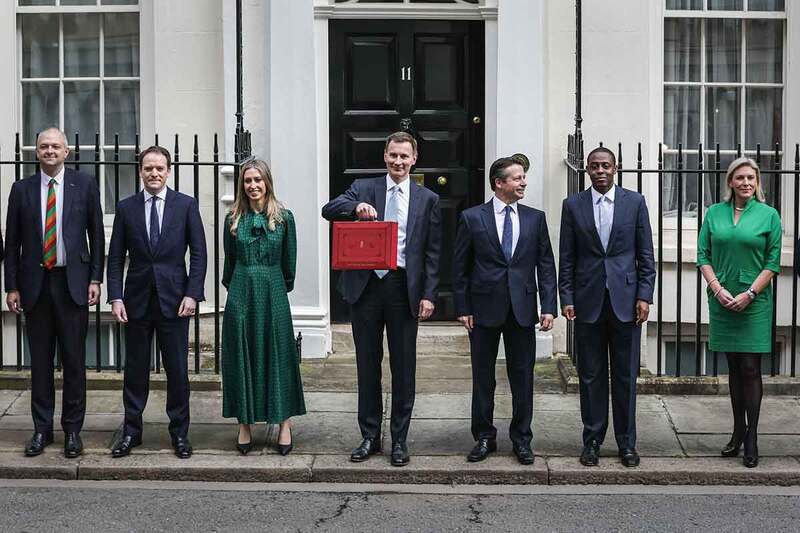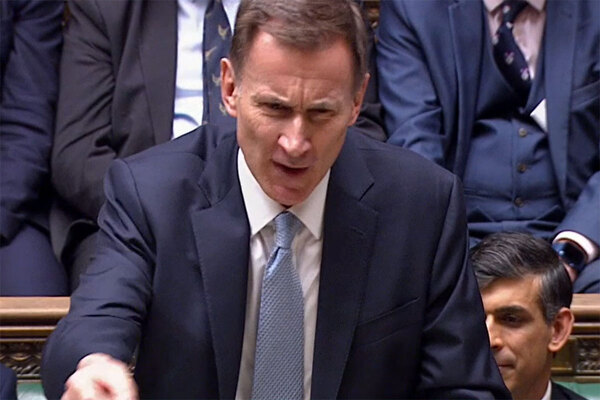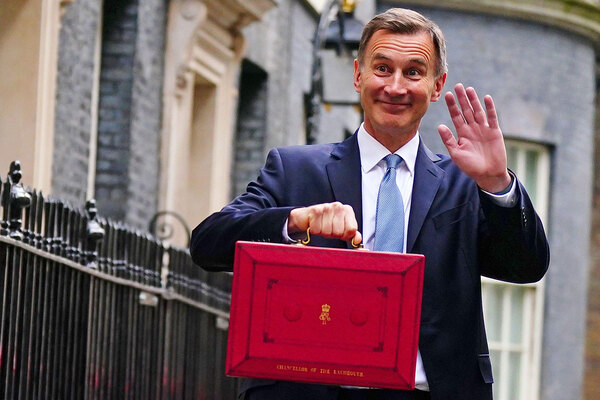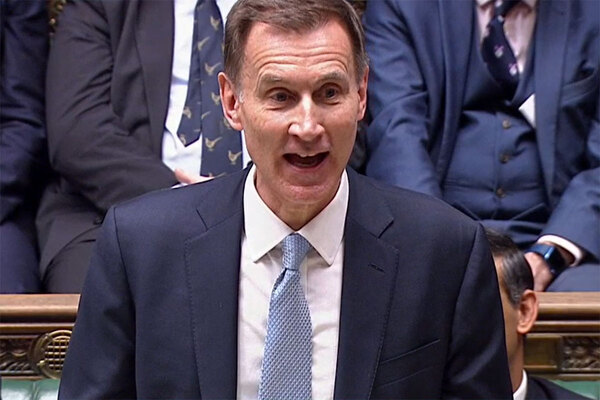You are viewing 1 of your 1 free articles
Spring Budget 2024: sector figures left ‘disappointed’ and frustrated by ‘missed opportunity’
Chancellor Jeremy Hunt has left the sector frustrated today, in what was the last Spring Budget before a general election.
The statement had echoes of last year’s March statement by being short on major housing announcements, prompting frustration and disappointment from across the sector in what some have described as a “missed opportunity”.
Inside Housing has rounded up some of the reactions below.
Sector bodies
Kate Henderson, chief executive of the National Housing Federation, said the group was “disappointed” that the Budget was “not used as an opportunity to address the housing emergency and chronic shortage of affordable homes across the country”.
She added: “The measures announced by the chancellor to support families on the lowest incomes, including the extension of the Household Support Fund (HSF), are welcome and will provide some relief for those who are struggling with the rising cost of living.
“However, with child homelessness at record levels and one in six children growing up in overcrowded homes with little space or privacy, urgent and meaningful action on housing is needed.
“This housing crisis can be solved but it requires a change of approach. The government must put an end to short-term thinking and piecemeal policy decisions and commit to a national long-term plan for housing which aims to deliver the secure, affordable, high-quality homes local people need.”
Gavin Smart, chief executive of the Chartered Institute of Housing, also branded it a “disappointing Budget”.
He said: “Given the significant housing crisis that we’re currently navigating, there was no mention of the urgent action needed to address this.
“There were some welcome announcements to help support people in debt, such as the temporary extension of the HSF, which we had called for, and the abolition of the Debt Relief Order charge, but they won’t bring down rising housing costs.
“In our pre-Budget submission we called for urgent action to boost social housing supply, invest in homelessness prevention and decarbonise the residential sector.
“These calls remain and we’ll continue to push the government to go further. We need a sustainable housing system to support a vibrant economy.”
Tracy Harrison, chief executive of the Northern Housing Consortium, said the group welcomed news about devolution, but added that “at its heart this is a Budget of missed opportunities”.
She said the new trailblazer deal announced in the North East, as well as those recently confirmed in the Liverpool City Region, South Yorkshire and West Yorkshire, will “benefit millions of northerners”.
She added: “The chancellor’s commitment to support levelling up is also a positive development. However, both these priorities risk being undermined by a continued crisis in local government funding.”
She also bemoaned the lack of a long-term plan for the Affordable Homes Programme (AHP) beyond 2026 “despite there being more than 420,000 households in the North on the waiting list for a social home”.
On decarbonisation, she said: “More than a third of the £3.8bn for decarbonising social housing pledged in the 2019 Conservative Party manifesto is still to be set out.”
She also pointed to a lack of commitment to make sure that Local Housing Allowance (LHA) “continues to keep pace with rising private rents”.
She concluded: “The lack of action on these fronts is disappointing for communities across the North.”
Housing associations
Andy Hulme, chief executive of G15 landlord Hyde, also branded it a “disappointing Budget for the millions of people denied access to an affordable and secure place to call home”.
He said: “This has been billed as a Budget for long-term growth and it was also reported that Number 10 was pushing hard for a ‘housing moment’ in the Budget. Sadly, on both counts this Budget is well wide of the mark.”
He added: “Spending £10bn on a cut to National Insurance (NI) will boost spending, but it is less clear how it will solve long-term problems and deliver long-term sustained growth. Analysis by the Resolution Foundation has also found that it benefits the more well-off the most, and offers little to many people who we provide homes for.”
Mr Hulme pointed to analysis last month showing that the number of affordable home starts in London this year is set to fall by more than three-quarters.
He added: “We want to challenge this government to live up to its promise on taking long-term decisions by making a 10-year plan for both rents and the AHP.”
Mark Washer, chief executive of 84,000-home SNG, said it was “clearly a pre-election Budget, with accordingly short-term prioritisation”.
He added: “Nonetheless action to address the human and financial cost of the now 142,000 children living in temporary accommodation is a massive missed opportunity. The negative impacts of this will be felt for years to come.
“Whoever delivers the next Budget must stop the tinkering and treat housing as national infrastructure that can deliver a huge productivity, health and well-being boost to lift the whole country over the term of the next parliament with a legacy lasting generations. Reallocating funding currently being wasted elsewhere into boosting the delivery of social rented homes is a must.”
Nicholas Harris, chief executive of 37,500-home Stonewater, believes the cut in NI will have little impact for its residents. “For a large number of our customers across the country, this is another headline that will have little positive impact on their overall household income,” he said.
“The cost of living crisis and high inflation continue to be more deeply felt by the UK’s poorest households, so the government needs to ensure that any changes they make are positively affecting customers of all income levels, particularly those currently hardest hit.”
Mark Perry, chief executive of 33,000-home Vivid, said: “Despite announcements around support for several specific development projects, the need for significant investment to drive the delivery of housing of all types and tenures, especially affordable homes, failed to be addressed in today’s Budget.
“Without investment across the board, from planning authorities to grant rates, and without support for a long-term housing plan here in the UK, the existing crisis will only be exacerbated to the country’s further detriment.”
Amanda Williams, chief investment officer at Aster Group, welcomed the £20m for community-led housing schemes.
She said: “We’ll be closely monitoring this funding as we’re one of the leading housing association providers of Community Land Trust partnerships, which deliver the homes communities both want and need.
“The matched funding for council planning departments is also important. However, we know in reality that there will need to be significant investment in staffing levels, upskilling employees and bringing in new technologies to drive efficiencies in planning.
“As ever, the goal is creating a system that ensures the homes communities desperately need – in line with Local Plans – can be proposed, approved and built quickly to tackle the chronic housing shortage.”
Charities
Rick Henderson, chief executive of Homeless Link, which represents homelessness charities, said: “The chancellor has made a dangerous decision to ignore the real experts – our members – and their repeated calls to safeguard invaluable homelessness services.
“This is astounding, coming only days after the annual rough sleeping and latest temporary accommodation statistics issued the starkest of warnings on the severity of this country’s homelessness emergency.”
He added: “The short extension of the HSF offers a scrap of hope. But without adequate and sustainable funding to homelessness support, which provides a literal lifeline for people being pushed into homelessness, we are likely to see rough sleeping spiral further out of control, with more and more people exposed to the trauma of sleeping on our streets and at risk of deteriorating health.”
Polly Neate, chief executive of Shelter, said: “Homelessness is a political choice. In the final Budget before a general election, with the housing emergency spiralling out of control, the chancellor has chosen inaction. By ignoring the vast number of people losing their homes, he is harming both the economy and people whose lives are being wrecked by homelessness.
“The chancellor is right that investment is the best way to improve productivity. Had he invested in building 90,000 social homes a year he could end homelessness, save the taxpayer money, boost jobs, reduce the burden of poor housing on our NHS and improve children’s life chances.
“If this government or the next is serious about wanting the economy to grow and people to thrive, investing in genuinely affordable housing is a no-brainer. Building 90,000 social homes would pay for themselves and return an impressive £37.8bn back to the economy in just three years.”
Councils
Shaun Davies, chair of the Local Government Association, said: “We are pleased the chancellor has extended the HSF, which has helped millions of households facing hardship.
“It is disappointing that we had to wait until the very last minute for an extension, and that it is only for a short period. Three-quarters of councils expect hardship to increase further in their area over the next 12 months.
“The government needs to use the next six months to agree a more sustainable successor to the HSF. Councils need certainty and consistent funding to efficiently maintain the staff, services and networks that help our most vulnerable residents. Without this we risk more people falling into financial crisis as we head into winter.
“It is disappointing that the government has not announced measures to adequately fund the local services people rely on every day.
“Councils continue to transform services but, given that core spending power in 2024-25 has been cut by 23.3% in real terms compared to 2010-11, it is unsustainable to expect them to keep doing more for less in the face of unprecedented cost and demand pressures.
He added: “Councils of all political colours are starting this financial year in a precarious position, and having to scale back or close a wide range of local services, so the continued squeeze in public spending in the years ahead is a frightening prospect for communities.
“This year also saw the sixth one-year settlement in a row for councils. Keeping them on a financial drip feed in this way has led to the steady weakening of local services.”
Mr Davies called for greater funding certainty through multi-year settlements to prevent this ongoing decline but also to ensure key national government policies – such as boosting economic growth, creating jobs and building homes – can be achieved.
You can read what the sector actually wanted from the Budget here.
Sign up for our daily newsletter
Already have an account? Click here to manage your newsletters













